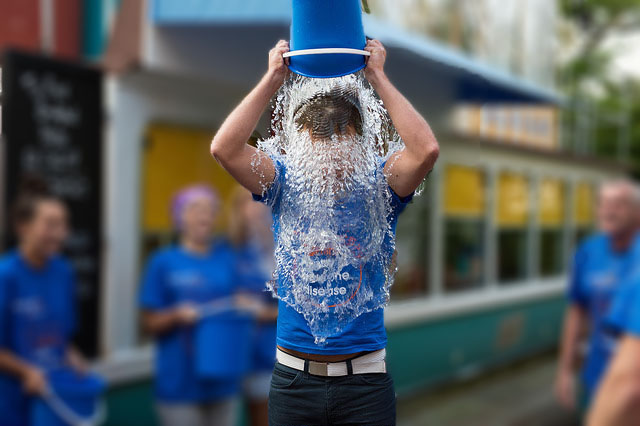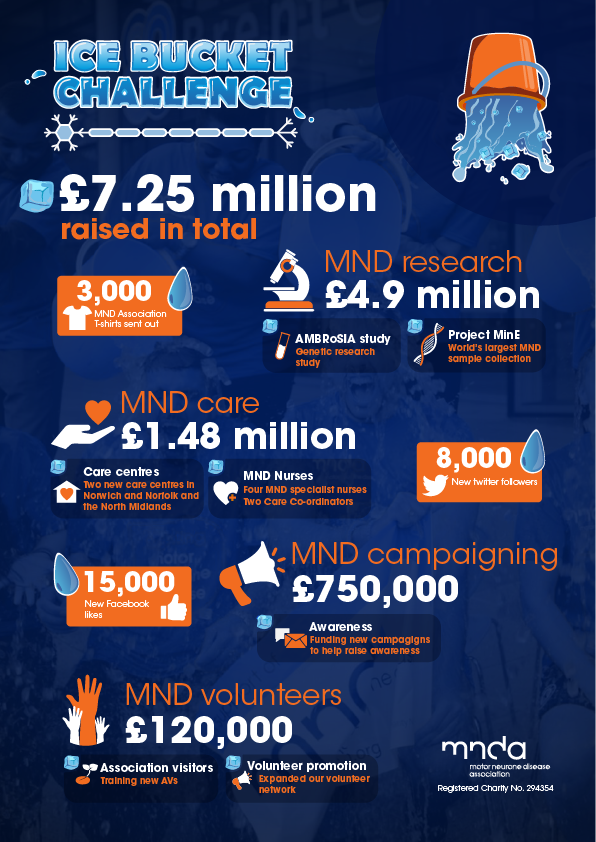This summer marks the 10th anniversary of the Ice Bucket Challenge – a global fundraising phenomenon which marked a turning point in the Association’s history.
Having started on social media in the US, the Ice Bucket Challenge soon began making waves around the world throughout the summer of 2014. Celebrities, families and individuals all took part, creating an online virtual event, the scale of which had never been seen before.
In the UK, the Ice Bucket Challenge started to gain momentum over the August Bank Holiday weekend with money flooding into the Association’s JustGiving fundraising page which was set up by volunteers Paula and Robert Maguire.
A decade of progress
In total, an incredible £7.25 million was raised to support our work and ten years later, the impact of the money raised is continuing. £4.9 million was targeted on igniting the fight against MND, funding research studies aiming to understand the genetic basis of MND.
Among them are Project MinE, the largest genetic research project to date and the AMBROSIA study, one of the world’s most comprehensive MND sample collections.
In the years since, Project MinE has collected DNA from more than 11,000 people across the world. In 2022, it was announced that 15 new genetic profiles which showed an increased risk for developing MND have been found through the study.
The data collected has also been used in several research studies to help identify possible subgroups of the disease and look for new potential treatments. AMBROSIA led to the confirmation of a particular biomarker of MND, called neurofilament light chain which holds neurones together and is released by the cells as they die.
Due to this research, neurofilament light chain is now being used in clinical trials of new potential treatments for MND to measure disease progression and to assess whether the treatment works.
A further £1.48 million was invested in boosting the Association’s MND Care Centre network ensuring more people living with and affected by MND could access high quality multidisciplinary care.
The money was targeted into opening two Care Centres in Norwich and Norfolk, and the North Midlands, as well as the recruitment of four specialist MND nurses, and two Care Co-ordinators, helping to reach people with MND in areas with the greatest need.
We also created new resources for children and young people whose lives have been affected by MND and set up the Welfare Benefits Service, which last year helped 1,037 people with MND to identify and claim more than £3 million in benefits owed to them.
A further £750,000 was spent on campaigns which helped to raise awareness of MND, while £120,000 was allocated to recruiting and training new volunteers.
The fight against MND continues
It’s impossible to overestimate the difference the Ice Bucket Challenge made – and continues to make in the fight against MND. But the fight goes on.
Throughout August the global MND community will be celebrating its own key moments and anniversaries from the summer of 2014 using the hashtag #IceBucketChallenge, with many choosing to take part in a fundraising event to mark the occasion or make a donation.
While we are not asking people to recreate the Ice Bucket Challenge from 10 years ago, we know some people may wish to. If you’d like to take on an ice bucket challenge please let us know by requesting your fundraising pack. We would urge people with MND in particular not to do the Ice Bucket Challenge.
Medical professionals have suggested that taking part in the challenge could cause health issues for people who are living with MND or with other pre-existing conditions.
There are lots of other ways to show your support for the Association, by taking part in a fundraising challenge or raising awareness. You can find more information here.
Your questions about the Ice Bucket Challenge, answered
What was the Ice Bucket Challenge?
The Ice Bucket Challenge was a social media phenomenon which started in the US during the summer of 2014.
The challenge saw celebrities, families and individuals raising money by pouring buckets of ice-cold water over their heads before nominating a friend, colleague or neighbour to get involved. Each challenge was recorded and shared on social media, creating a powerful wave of activity which quickly spread around the world.
In the UK, the Ice Bucket Challenge hit over the August Bank Holiday weekend, and it wasn’t long before a surge of donations flooded into the Association’s JustGiving page, set-up by volunteers Paula and Robert Maguire. In just a few short days, the Ice Bucket Challenge raised £7.25million, changing the course of the Association’s work for good.
In the years since, the money raised has provided the catalyst to important advances in genetic research, opened up access to care for many more people living with MND, and helped us to develop more resources and information to support those affected.
Who did the IBC?
During the long, hot summer of 2014, the Ice Bucket Challenge captured the hearts and minds of people all over the world, many of whom had never heard of MND before.
In many ways, the success of the Ice Bucket Challenge was due to its simplicity, uniting fundraisers of all ages, from all walks of life, in a way that had never been seen before.
Among those who took part in the UK were Association Patrons Benedict Cumberbatch and Eddie Redmayne, as well as other celebrities including David and Victoria Beckham, Frankie Dettori and Clare Balding.
How much did the MND Association raise from the IBC?
An incredible £7.25million was raised for the MND Association.
What did you spend the money on?
As the success of the Ice Bucket Challenge became clearer, the Association’s members played a key role in pinpointing where the money raised during the Ice Bucket Challenge should be spent.
As a result, we invested money in the following key areas:
- £4.9 million on MND research studies to understand the genetic basis of MND;
- £1.48 million on two new MND care centres in Norwich and Norfolk and the North Midlands as well as the recruitment of four specialist MND nurses and two Care Co-ordinators. The money also helped to establish the Association’s Welfare Benefits Services and our work with children and young people;
- £750,000 on raising awareness and £120,000 on volunteering.
Why haven’t we found a cure because of the IBC?
MND is incredibly complex, and researchers are working incredibly hard to understand more about the disease, and then find ways to treat or cure it.
In 2014, when the Ice Bucket Challenge took off, only one MND clinical trial was taking place in the UK and the MND Association’s research portfolio was valued at £8.2 million. Ten years later in 2024 our charity’s research portfolio has nearly trebled, to £21.5 million, and we are supporting progress through more than 100 projects including multiple clinical trials.
Each project funded by the success of the Ice Bucket Challenge has advanced the search for effective new treatments for MND by several years and paved the way for significant progress.
One of them, Project MiNE, has already identified a number of genes which are believed to play a key role in the development of MND. This work just wouldn’t have been possible without the success of the Ice Bucket Challenge.
Are you going to make it go viral for the 10th anniversary?
The Ice Bucket Challenge was an extraordinary moment in time and one which would be almost impossible to replicate.
In the decade since, social media trends, platforms and audiences have changed and moved on making it very difficult to predict which videos or posts will go viral.
Rather than invest resource and money into an activity which is unlikely to succeed, the Association is taking the opportunity to reflect on the incredible impact the Ice Bucket Challenge has already had on our work and the legacy it leaves for the future.
Of course, if people do wish to take the Ice Bucket Challenge and donate money to the MND Association we would be incredibly grateful.
You can find more about the ways in which you can help us here.
Why aren’t you promoting people to do IBC?
The Ice Bucket Challenge was a unique activity, started by supporters of other MND charities in Australia and the United States. By the time it reached the UK, it was a global phenomenon. It was the first viral fundraising campaign on social media of its kind and, despite the efforts of lots of other charities since, it has never been effectively replicated.
There were many reasons why it reached so many people including the fact it was a very hot summer, it really took off in the UK over the August bank holiday, many high profile people took part and social media audiences were concentrated on Facebook and Twitter.
How much will you raise this time?
We have no expectations for how much may be raised by people marking the Ice Bucket Challenge’s 10th anniversary.
Can you send me materials to do my own IBC?
We can provide branded t-shirts to people who wish to register to take part in a fundraising activity for the Association. You can register your fundraising on our website.
Other charities are promoting the ice bucket challenge to raise money. Why aren’t you?
We are using the 10th anniversary of the ice bucket challenge to focus on sharing what has been achieved thanks to the money raised.
We are also promoting other ways people can raise money to support our vital work.

